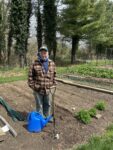
Extending the Growing Season: Rick Bogusch Talks About Winter Gardening Workshop Offered by Peconic Land Trust
For some, the idea of winter gardening might sound like an oxymoron. But the colder months can be more productive than one might imagine, even without the benefit of a greenhouse.
On Saturday, October 19, the Peconic Land Trust will host a workshop titled “The Organic Winter Garden — What To Do Now,” from 11 a.m. to 1 p.m. at Bridge Gardens, located at 36 Mitchell Lane in Bridgehampton.
The workshop will be led by Renato Stafford of Homegrown Organic Foods, who will share tips and techniques for extending the growing season.
Topics covered will include the importance of the soil and compost, cold-hardy vegetables, zero-energy greenhouse designs, harvesting practices, seed saving, and more. All attendees will leave with a head of garlic to plant and vegetable seeds as well.
Rick Bogusch is the Garden Director at Bridge Gardens, which is run by the trust, and is an avid gardener — and winter gardener — himself. He spoke in September about what the workshop will offer and why extending the growing season is a worthwhile pursuit for gardening enthusiasts.
Q: Tell me about the basics of what this workshop will offer, and what attendees can expect.
We’re talking about extending the growing season into the cold weather months. We have a relatively long season here, and there’s a lot that you can grow in late winter and early spring, and a lot you can do in the fall and into early winter.
Q: Some people might assume you need a greenhouse to make winter gardening a reality. How important is it to have a greenhouse if you want to extend the growing season into the winter?
You can do a lot with a greenhouse, but you don’t have to have a greenhouse. There are other methods you can employ in your garden outside, using tunnels with plastic or frost cloth, to protect from cold weather.
If you really want to be diligent, you can uncover [your crops] every day and cover them every night. It’s surprising what you can get. Last year, I had arugula, cilantro, spinach, radishes — and they all kept going. I harvested turnips in December and January, and they were not protected, so imagine what you can do it you protect them. All the mustards and kale, those are good cold weather crops, too.
Q: What kinds of crops and vegetables are best for winter gardening and would do well with frost cloth?
There are a lot of cool-season crops. You really can’t do it with tomatoes or eggplant or peppers, but maybe with cabbage or broccoli or cauliflower. And you may not even need it, because they’re so cold-tolerant to begin with. Choosing the right variety is important, too.
Q: As the name implies, winter gardening involves being cold, so tell me why you think it’s a worthwhile pursuit.
For me, it allows me to get out there and garden in the winter. I just think that, for me, it’s a challenge, and it’s rewarding, because you can get fresh greens and some other vegetables to add to your kitchen and your table, so that’s worth the extra effort.
There are some beautiful, sunny days in January or February when it’s in the 30s, and you have no wind, and it’s a great time to be outside. And you can get a jump-start on everything you have to do in the spring.
To register, visit peconiclandtrust.org.



